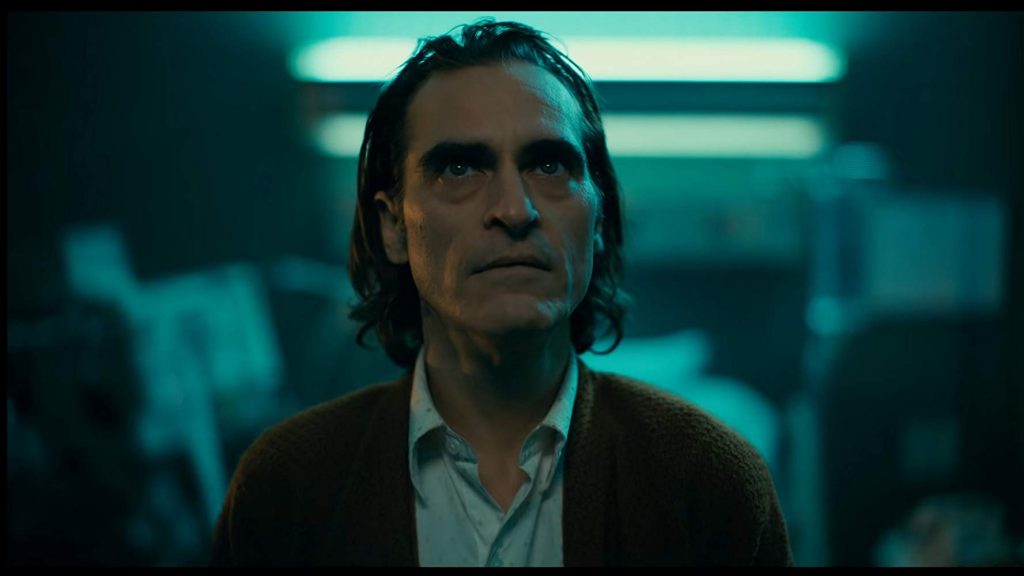At the beginning, Joker starts with Arthur Fleck (Joaquin Phoenix) sitting in front of a dressing mirror, pulling at the corners of his mouth, forcing a grin and a grimace. This is reminiscent of the two masks, tragic and comic, that actors wore for ancient Greek dramas. They are a reference to a later line in the script: Arthur Fleck first thought that his life was a tragedy, but he soon comes to see his life as a comedy.
Arthur Fleck is a down-on-his-luck, always smiling guy who works as a clown. He has a variety of mental illnesses that requires seven different kinds of medications, which include him laughing uncontrollably whenever he is stressed or distressed. He takes care of his ailing mother and is trying to launch a career in stand up comedy. It’s just that his life is like a never-ending car pile up of bad luck: just when you think it couldn’t get any worse, it does. He gets set up by a coworker and is fired, and on his ride home, he is beaten up by three Wayne employees.
It’s when he ends up killing these three men that Arthur starts to go down a dark path that frees his inhibitions. He gets an outlet for his frustrations and grows bolder; even as life keeps piling on more shit, Arthur takes charge and carves a path of violence through Gotham.
Arthur’s internal strife is mirrored on the city he lives in: Gotham is filled with trouble and unrest, with the poor harboring a grudge against the arrogant rich elite. Arthur’s actions is the spark that lights the fire, and soon Gotham is engulfed in protests (and eventually, a riot).
Directed by Todd Philips, Joker gives a new spin on the classic idea of ‘a guy having a really, really bad day’. It’s not just that Arthur’s having a bad day, it’s also that he has been shaped by years of trauma and negligence.
Arthur never really gets a chance of redemption: his circumstances are so dire that the only time he feels in control is when he lets go of his moral compass.

The star of the show is, undoubtedly, Joaquin Phoenix, who makes his performance as Arthur Fleck completely his own. From his quivering lips (and tears) peeking through his uncontrollable laughter, to the weird, airy way he dances in his bathroom (and later on the streets), there’s something magnetic about his performance throughout the film. His bony, emaciated body stands out, literally: his ribs poke against his skin in many scenes, as does his spine. His take on Joker is unique and distinct from Ledger’s iconic performance.
The way Phoenix portrays Fleck blends sympathy and disgust: you feel sorry for him, but there’s no condoning his actions once he goes down the rabbit hole.
The supporting cast is generally solid, with Zazie Beetz playing Arthur’s neighbor (and romantic interest), and Robert De Niro playing late night talk show host Murray Franklin. Brett Cullen is also there as Thomas Wayne. Both Wayne and Franklin represent two father figures for Arthur, and both of them end up scorning him, which further fuels his spree of violence.
Joker is crafted with care and attention, but after a point, its plot beats feel noticeably predictable. Thankfully, the tense climax saves it from crossing over from predictable to dour. As a film, it’s meant to spark outrage and generate discussion (and ticket sales), and while it does raise questions about mental illness, welfare cuts and class divide, these are mostly scenery that serve as backgrounds to the slow unfolding of Arthur’s rampage.
The film wears its homage to Scorsese films like Taxi Driver and King of Comedy proudly on its sleeves.
If you are familiar with these movies, then the homage might sometimes feel too transparent and distract from the main narrative.
The praise for Joker is inescapable: some have called it a masterpiece. On the other hand, there’s a lot of criticism too: some call it needlessly dark, trading on its edge to mask its shallow aping of past classics. The truth, I think, lies somewhere in the middle. Joker is well made, but at the same time, it’s no auteur-driven exploration on the intricacies of the human condition. The sometimes average script is elevated by Phoenix’s singular performance. Yes, it’s definitely better than Gemini Man, and is generally more engaging than the sometimes-navel gazing Ad Astra. The soundtrack is also strikingly elegant, which makes the theater-going experience much more cinematic.
As for the controversial nature of the film, it’s tough to say if it will indeed violence among incels or other isolated individuals who feel similarly lonely and maligned. Catcher in the Rye did go onto inspire Mark David Chapman to kill John Lennon, and although I am reluctant to place Joker beside that kind of infamy, it’s hard to ignore the allure a film like this may have for some individuals.
Let’s just hope they are also listening to the better angels of their nature and see Joker as what it is: an enjoyable piece of entertainment (and not an instruction manual for murder sprees).